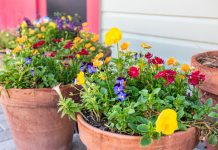
Photograph by Martha Williams
Choosing to postpone having children or even adopting pets, many young adults are seeking something more affordable and low maintenance to nourish—houseplants. According to the National Gardening Survey, 18- to 34-year-olds make up nearly 30 percent of gardening households, a market long dominated by baby boomers. On Instagram, the hashtag #plantparenthood shows more than 1.5 million posts, while a search for #planttok generates 2 billion videos, covering everything from repotting and proper fertilization to elaborate DIY greenhouses.
One of those self-described “plant parents” is 30-year-old Crystal Thomas, co-owner of Tropical Express, which started as a pop-up stand on Memorial Drive in 2020. Now located inside the Goat Farm, it is one of a growing number of Atlanta spots catering to plant enthusiasts.
According to Thomas, plants are an easy way for urban dwellers like her to bring the outside indoors. “Many people don’t have yards, so it can be hard to get close to nature,” she says.
Moreover, while a vibrant collection of calatheas and anthuriums can transform a sterile apartment, plants do more than look pretty. Research shows that indoor plants act as air purifiers, absorbing carbon dioxide and releasing oxygen—boosting mood, energy, and productivity while decreasing symptoms of respiratory illnesses, allergies, and headaches.
In fact, the very ritual of taking care of houseplants is therapeutic, says Tiana Florence, owner of Botanical Safari, a plant shop with locations in Douglasville and at Phipps Plaza. “It’s a type of self-care.”
Cooking with homegrown herbs, fruits, and vegetables adds flavor while decreasing dependence on grocery stores and reducing your carbon footprint, says Steve Place, a horticulturist with Georgia Tech’s Kendeda Building for Innovative Sustainable Design.
Choose plants that are compatible with your lifestyle, home environment, and expertise. For example, pet owners should stick to nontoxic plants like ponytail palms. “The prettiest plant may not be the best option for you,” warns Thomas.
Here are a few local specialty shops to get you growing:
Botanical Safari
Both locations offer a “new plant parent” bundle—a potted six-inch snake plant, ZZ (Zamioculcas zamiifolia), and pothos ($50)—plus accessories like organic plant food and moisture meters.
Flora/Fauna
Katelynn Corley and Rex Holloway, owners of this quaint Cabbagetown shop, sell hard-to-find houseplants like Anthurium eitchii (pictured), rare orchids, and dragon jade, which all look even more striking in Holloway’s homemade minimalist ceramic pots, also for sale.
Lush Plant Co.
Founded by sisters Andrea Kidd and Jennifer Martha, this Decatur store offers small, indoor plants like succulents, ferns, vines, and monsteras—priced as low as $4. Contactless delivery is free within three miles.
PlantHouse
Part plant emporium, part educational center, PlantHouse Decatur offers a variety of houseplants and ceramics as well as workshops on topics such as DIY terrariums, dried floral arrangements, and bonsai. Potting service is complimentary with plant purchases, and the forthcoming Star Metals District location will have an in-store bar.
Tropical Express
For big statement plants like birds of paradise and large calatheas, check out this intimate shop inside the Goat Farm.
Varnish & Vine
Plant parents head to this College Park shop for rare cacti cuttings—think small and large Peruvian apples—plus prepotted cacti and rooted varieties like hedgehog aloe. The shop also sells a selection of tropical plants like monsteras and ficuses.
The Victorian Atlanta
At the East Atlanta Village outpost of this husband-and-wife–owned shop, sip on Bellwood Coffee while browsing plants from common varieties to exotic cacti, plus soil, pots, and accessories. Formerly located inside Citizen Supply, the Victorian also has a location at Ponce City Market.
This article appears in our March 2022 issue.













